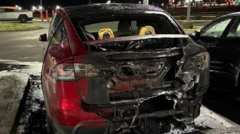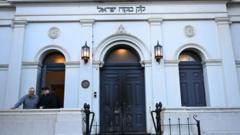Three individuals charged with vandalizing Tesla dealerships in the U.S. may serve up to 20 years in prison, following comments from Attorney General Pam Bondi that classify their actions as domestic terrorism. The vandalism, which includes arson and destruction of property, has sparked a nationwide wave of protests against Tesla and its CEO, Elon Musk.
**Vandalism at Tesla Dealerships Could Lead to 20-Year Sentences, Warns Attorney General**

**Vandalism at Tesla Dealerships Could Lead to 20-Year Sentences, Warns Attorney General**
Three defendants accused of vandalizing Tesla properties face severe penalties under allegations of domestic terrorism.
In a recent announcement, Attorney General Pam Bondi highlighted that three suspects involved in incidents of vandalism at Tesla dealerships could be looking at lengthy prison sentences, potentially up to two decades. Bondi classified the acts of damage inflicted on vehicles, dealerships, and charging stations as acts of domestic terrorism, signifying a serious response from law enforcement.
Although there is no defined law specifically addressing domestic terrorism in the U.S., prosecutors are able to pursue lengthier prison sentences if a terror-related motive can be established. Both Musk and former President Trump have denounced these attacks as domestic terrorism, noting that individuals connected to the former administration have also faced harrowing "swatting" incidents — instances where hoax emergency calls lead to armed police raids.
The shocking series of vandalism incidents included a Molotov cocktail attack on a Tesla dealership in Colorado, attributed to suspect Lucy Nelson, who has been charged with possession of a destructive device and malicious destruction of property. While the damage estimates range from $5,000 to $20,000, Nelson has pleaded not guilty to the charges.
Adam Matthew Lansky, another suspect charged with a similar offense, allegedly threw Molotov cocktails at a Tesla dealership in Salem, Oregon. His preliminary hearing is scheduled for April, while the third suspect, 24-year-old Daniel Clarke-Pounder, faces arson charges for his actions against charging stations in South Carolina.
In light of these events, Bondi severely warned potential vandals: "The days of committing crimes without consequence have ended." She urged anyone considering similar actions against Tesla to reconsider, given the serious ramifications.
This crackdown on vandalism at Tesla facilities signals a broader concern about individual safety and property security, as these shops continue to be targeted amid growing tensions surrounding the political influence of their CEO and the actions of certain protest groups.
Although there is no defined law specifically addressing domestic terrorism in the U.S., prosecutors are able to pursue lengthier prison sentences if a terror-related motive can be established. Both Musk and former President Trump have denounced these attacks as domestic terrorism, noting that individuals connected to the former administration have also faced harrowing "swatting" incidents — instances where hoax emergency calls lead to armed police raids.
The shocking series of vandalism incidents included a Molotov cocktail attack on a Tesla dealership in Colorado, attributed to suspect Lucy Nelson, who has been charged with possession of a destructive device and malicious destruction of property. While the damage estimates range from $5,000 to $20,000, Nelson has pleaded not guilty to the charges.
Adam Matthew Lansky, another suspect charged with a similar offense, allegedly threw Molotov cocktails at a Tesla dealership in Salem, Oregon. His preliminary hearing is scheduled for April, while the third suspect, 24-year-old Daniel Clarke-Pounder, faces arson charges for his actions against charging stations in South Carolina.
In light of these events, Bondi severely warned potential vandals: "The days of committing crimes without consequence have ended." She urged anyone considering similar actions against Tesla to reconsider, given the serious ramifications.
This crackdown on vandalism at Tesla facilities signals a broader concern about individual safety and property security, as these shops continue to be targeted amid growing tensions surrounding the political influence of their CEO and the actions of certain protest groups.





















